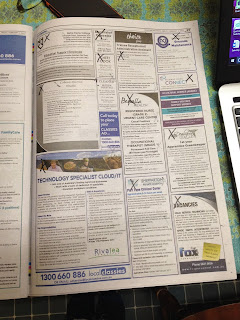Before today's appointment at MADEC I'd never noticed that you can almost gauge how long someone has been out of work from their walk. A man (I have only noticed this in men) who is only just unemployed has a purposeful bearing: one could even say active and vigourous. Someone who has been looking for work for a long time, and has had plenty of knockbacks, has a different stride. 'Ponderous' is the best adjective, whether or not the person is out of shape or not. Imagine a person who finds that the burden of existence increases by the weight of a five-cent piece (a dime for American readers) every few hours for years. Still other people (women more than men) develop a thin-to-emaciated look that, rightly or wrongly, one tends to associate with ice addiction. Their eyes are alert and their movements are quick. These people tend to find and lose jobs quickly.
 |
| Two old men eating soup, by Francisco Goya (Image from here) |
 |
| Shepparton News, 3 February 2017, showing jobs marked off |
"Are you going to apply for it?" she asked.
I replied probably not.
"What, so you're not even going to try?"
"Well, I last did that work nearly twenty-five years ago, so I can't imagine I'd be the preferred candidate"
This exchange was enlightening. If we assume that the consultant was sincere, then finding work would seem to be a kind of bizarre lottery where one's prospects of success increase in relation to the number of tickets one buys even when the odds against you remain stratospheric. The lesson from this for me is that I don't think I'll again consider I've learned anything much about the human condition from representing injured people. The gulf in experience is too wide. I must also doubt how much we can really learn from books like Life at the Bottom or London Labour and the London Poor.
I had also never quite understood how easily you can come to see others as your enemy. Recently the Australian Broadcasting Corporation covered a story of fruitgrowers in this area facing a labour shortage in the absence of backpackers. It's no secret that fruitgrowers will also refuse to hire Australians in general and welfare recipients in particular as pickers. As one has said
Anybody in industry knows that people on welfare, well intentioned as they may be, are not a reliable source of labour to do the hard, low-paying work that is available on farms.Despite this, the denizens of Facebook were confident that any fault for not having a job as a picker would lie with the unemployed themselves:
After reading things like this I found myself understanding why radicals like Abiezer Coppe could gain a following among the poorest people: faced with a brick wall of scorn and contempt, the only way out can seem to be by waiting for the world to turn upside down.
| Abiezer Coppe, A Fiery Flying Roll (n.pub.: London, 1649) |
No comments:
Post a Comment